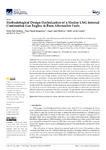Methodological Design Optimization of a Marine LNG Internal Combustion Gas Engine to Burn Alternative Fuels

Use this link to cite
http://hdl.handle.net/2183/35092
Except where otherwise noted, this item's license is described as Creative Commons Attribution 4.0 International (CC BY)
Collections
Metadata
Show full item recordTitle
Methodological Design Optimization of a Marine LNG Internal Combustion Gas Engine to Burn Alternative FuelsAuthor(s)
Date
2023Citation
Ruiz Zardoya, A.; Oregui Bengoetxea, I.; Lopez Martinez, A.; Loroño Lucena, I.; Orosa, J.A. Methodological Design Optimization of a Marine LNG Internal Combustion Gas Engine to Burn Alternative Fuels. J. Mar. Sci. Eng. 2023, 11, 1194. https://doi.org/10.3390/jmse11061194
Abstract
[Abstract] Marine emission policies are becoming more demanding; thus, ship propulsion and power generation technologies need to be adapted to current scenarios. LNG is already considered to be a transition fuel, and new alternative marine fuels are emerging. The aim of this study was to develop an innovative methodology to optimize and adapt the combustion system of an LNG internal combustion marine engine to burn alternative marine fuels. The present study was based on LBG, but the methodology could be replicated with other fuels. A total of six tests were carried out, with three prechamber designs and three spark plug designs. Each test was carried out in a single-cylinder engine with two types of high-methane-number fuel. The influence on thermal efficiency parameters such as the prechamber volume, the orientation of the flame holes, and the existence of a central hole was studied. In the case of the spark plug, the influence of the amount of precious metal in the electrode, its shape and its insertion into the prechamber were analysed. Experiments showed that by modifying both the prechamber and the spark plug, maximum improvements in thermal efficiency of 1.9% can be achieved. Those improvements allowed the LBG engine to suffer only a 4.3% thermal efficiency reduction, as opposed to its LNG counterpart. By applying the proposed methodology, the thermal efficiency of commercially available internal combustion gas engines could be improved.
Keywords
Design
Prechamber
Engine
Alternative marine fuels
Efficiency
Prechamber
Engine
Alternative marine fuels
Efficiency
Editor version
Rights
Creative Commons Attribution 4.0 International (CC BY)






